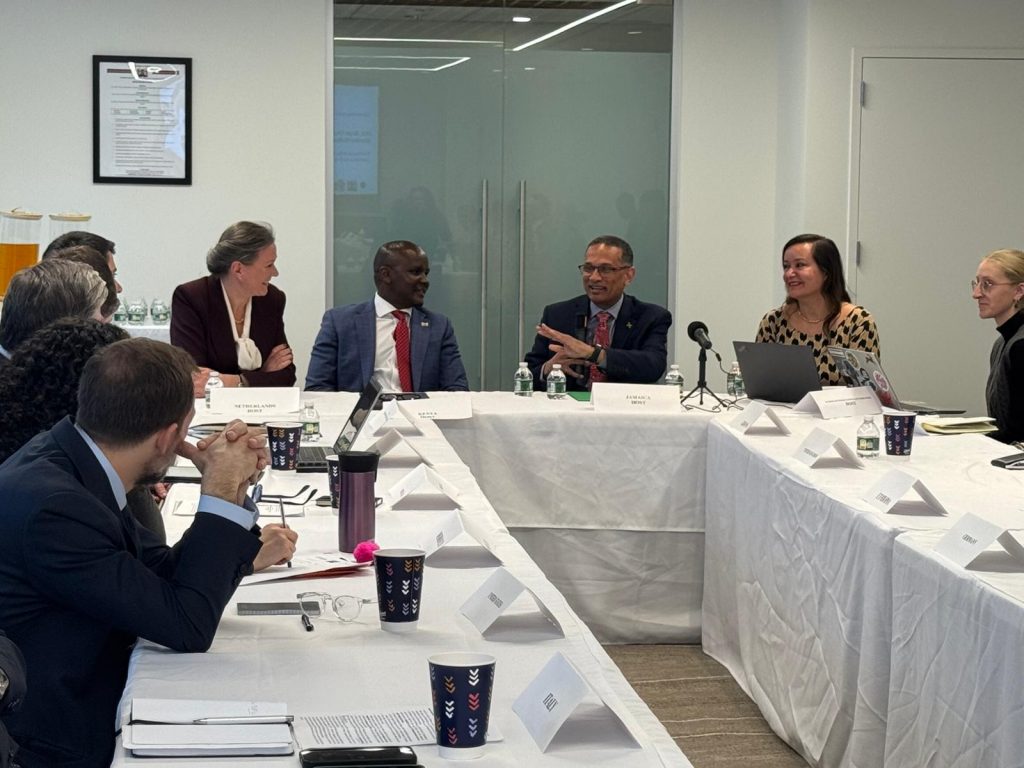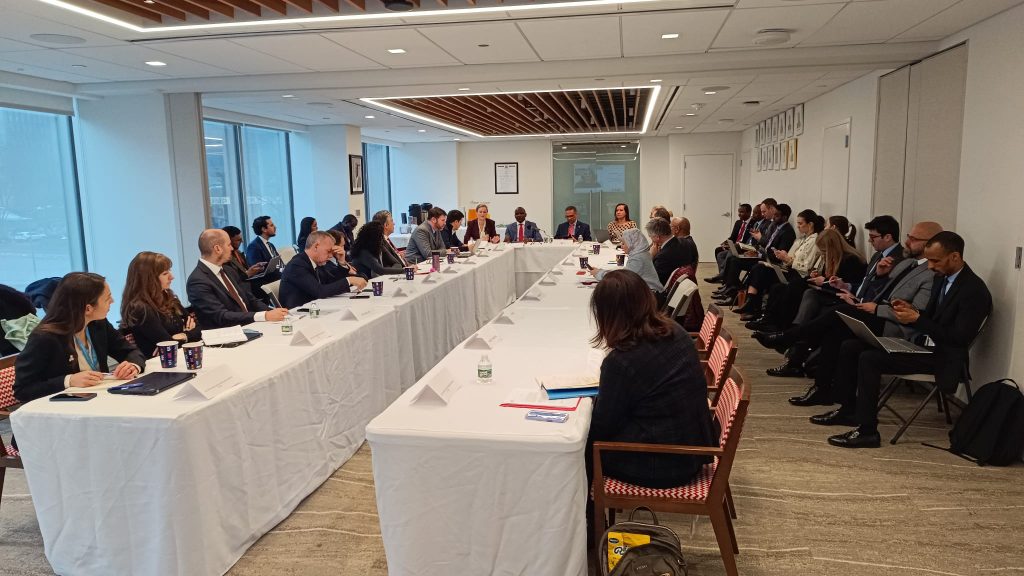
Note: The event was held under Chatham House rules. We have permission to name invited speakers, but not from open discussion so we cannot use identifying information.
13th February marked the first of a five-part Declaration on Future Generations (DFG) Dialogue Series. Under the title “Building Hopeful Futures – Implementing the DFG”, the dialogue series is a strategic and coalition building initiative hosted by the Permanent Mission of Kenya and the School of International Futures (SOIF), in collaboration with the Permanent Missions of Jamaica and the Kingdom of the Netherlands.
The Declaration on Future Generations is a historic commitment to future generations endorsed by consensus at the UN Summit of the Future in September 2024. The Declaration acknowledges “the primary role and responsibility of governments, at all levels, in line with their respective constitutional frameworks, towards safeguarding the needs and interests of future generations”. It recognises the need to undergo systemic change in favour of long-term and inclusive governance ecosystems.
This first session of the dialogue series focused on the Future Generations agenda in Africa, bringing to the table a set of initiatives from Kenya, Cameroon, Nigeria and South Africa that show how implementation is already happening. Participants reflected on how these tangible actions and pockets of innovation across citizens, organisations and leaders (the foresight governance prism) are already transforming governance and serve as valuable models for learning and scaling.
The innovations discussed at the event demonstrate that Africa is not just participating in the conversation on long-term governance – African nations are leading the way.

Bridging the generational divide
As host of the first Dialogue, Kenyan Ambassador Lokaale, set the tone for the discussion, highlighting the pressing issue of Africa’s rapidly growing youth population yet lack of representation in decision making. In a similar vein, the DFG co-facilitators from Jamaica and the Netherlands, emphasised the importance of starting this conversation from Africa.
“The African demographic reality creates lots of opportunities, but also a risk if we don’t get it right”, said Ambassador Wallace from Jamaica, who also reminded participants of the importance of “breaking away from electoral cycles”.
“It is poignant that the first implementation push after the Declaration was adopted by consensus is an event centred around Africa. It is exactly the right way to start”, said Ambassador van Haaren, Permanent Representative from the Netherlands.
Against this background, Assistant Secretary-General for Youth Affairs, Dr Felipe Paullier, emphasised a crucial distinction to be made between youth and future generations. Young people are not just the future, they are the present. With 60% of Africa’s population under 25, their voices must be central in shaping policies that impact both current and future generations. Frameworks like the UN 2030 Agenda and Africa’s Agenda 2063, said Paullier, must prioritise youth engagement to ensure intergenerational equity and trust in institutions.
“The African demographic reality creates lots of opportunities, but also a risk if we don’t get it right.”
– Ambassador Brian Wallace, Jamaica
Uncovering and spotlighting African innovations
Senator Ledama Olekina from Kenya shared his hopes that Kenya’s bipartisan Senate Futures Caucus will become an official Committee for the Future. The Senator emphasised the need for legislative scrutiny of policies impacting future generations, informed by his experience at the Third World Summit of the Committees of the Future, co-organised by the Senate of Chile and the Inter-Parliamentary Union (IPU), a nod to the importance of international shared learning. A key initiative is a legislative tool for intergenerational impact assessments, alongside integrating foresight into fiscal planning through Kenya’s Parliamentary Budget Office to ensure long-term sustainability.
Mohammed Ahmed, Special Assistant to the President of Nigeria on Special Duties, shared efforts in developing a national foresight capacity program to integrate long-term thinking into policy and governance. Mohammed also shared plans for a foresight compliance evaluation mechanism, ensuring that policies and national strategies align with future generations’ needs. Youth empowerment is central to this effort, too, with ongoing investments in digital public infrastructure, the National Youth Investment Fund, and a National Youth Conference launching this year.
Esther Ajudeonu, from Nigeria’s Primacy Youth Development Initiative, noted that “Africa has the fastest-growing youthful population, and by 2030, we are projected to have 1 billion youth.” Esther shared plans on youth engagement at the upcoming African Future Summit.
Dr Nsah Mala, Chair of Mbessa Kingdom Commission for Future Generations and Sustainability in Cameroon, described the work of the Indigenous Commission for Future Generations on Sustainability in Mbessa, where they are working towards aligning the implementation of the Declaration with local indigenous realities. These include providing pipeborne water, biodiversity conservation, and youth and gender empowerment. Nationally, a growing caucus is engaging parliamentarians on policies for future generations, focusing on natural resource management and the circular economy. The Ministry of Youth is also updating the national youth policy to align with global commitments.
“Young people are not just the future, they are the present.”
– Dr Felipe Paullier, UN Assistant Secretary-General
for Youth Affairs
Support from around the world
Reflecting on the presentations, those in attendance, under Chatham House Rules, discussed the following:
- Economic & Resource Planning. Sustainable financing and responsible debt management are key to protecting future generations, ensuring that present-day policies do not burden them with unsustainable economic challenges.
- Balancing Present & Future Needs. Addressing the immediate challenges of youth, such as education, jobs, and finance, is critical while also safeguarding long-term sustainability for future generations.
- Foresight & Policy Alignment. National and multilateral strategies must incorporate long-term thinking, ensuring alignment between global frameworks and local realities. Electoral cycles often prioritise short-term goals, making strategic foresight crucial for sustainable policy planning.
- Cultural & Institutional Foundations. Concepts like good ancestry and intergenerational responsibility exist across societies and can be leveraged to promote long-term policymaking.
- Multi-stakeholder Engagement. Collaboration with civil society, academia, and the private sector is essential to building a robust framework for implementation.
This dialogue set the stage for a broader conversation on Future Generations governance in Africa. It laid the foundation for future engagements, particularly at the AU Summit, the G20, and the UN Financing for Development Conference.
Strengthening international collaboration, through initiatives like this dialogue series, will ensure that lessons from different regions contribute to a more effective and unified approach to safeguarding future generations. The next Dialogue in April will address the opportunities brought by the upcoming UN Conference on Financing For Development in June 2025 in Seville (Spain), to address the current challenges of global financial and development architecture.
Notes:
- A huge thank you to the Ambassadors and the Kenya Mission to the UN for kindly hosting the event.
- For further information on in-country innovations, technical advice on implementation or opportunities for engagement, please contact: School of International Futures (SOIF).
